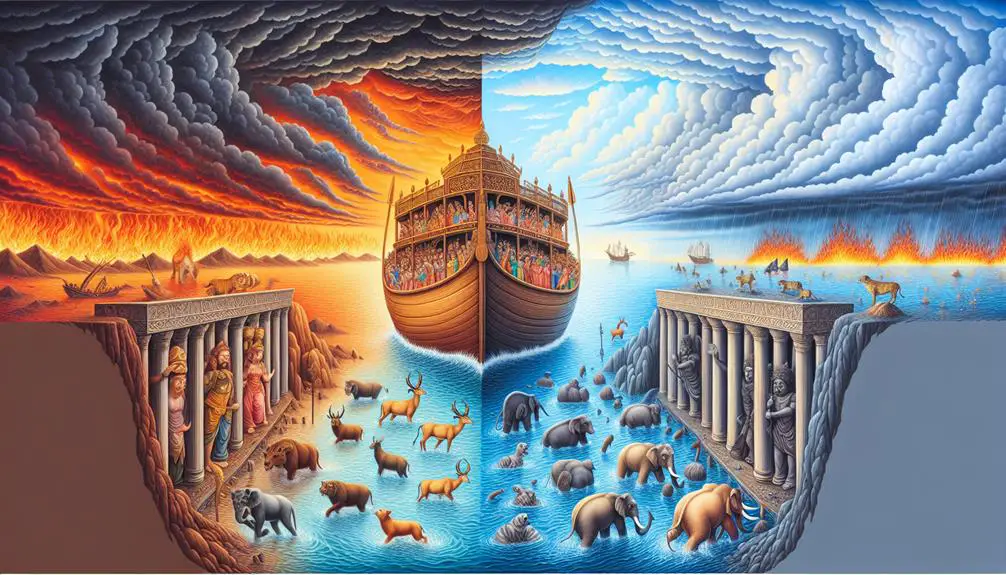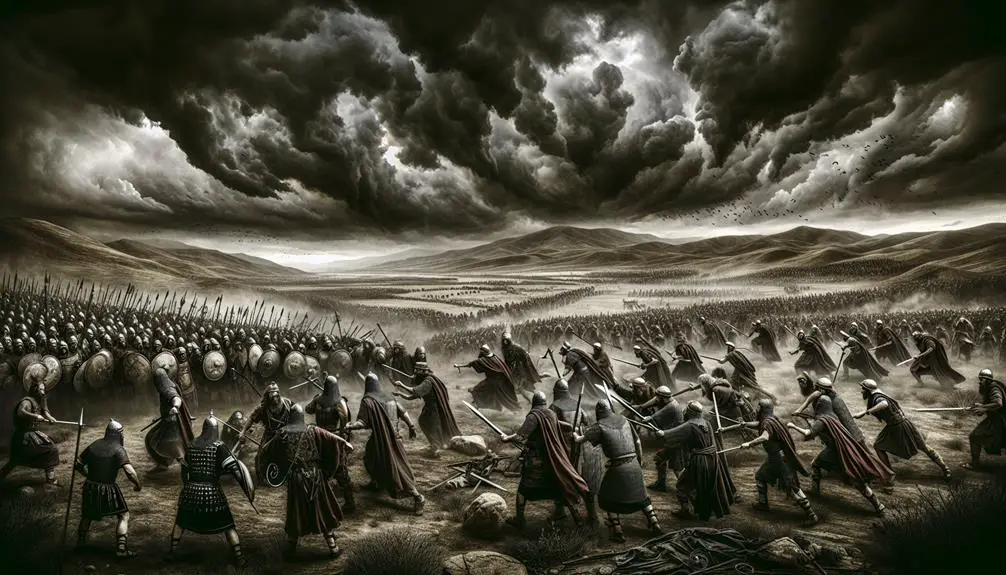This exploration of calamity in the Bible reveals divine judgment and transformation, inviting a deeper understanding of faith and morality.

Define Calamity in the Bible
In the Bible, calamity strikes as both a divine judgment and a catalyst for transformation; it devastates lands and tests faiths. You'll find that these events, from the floods that cleanse to the plagues that punish, serve not just as punishments but as profound lessons on morality, faith, and redemption.
As you explore the origins and outcomes of such divine interventions, consider how they shape the moral landscape of biblical narratives. This journey through scripture might leave you with more questions than answers, but it promises a deeper understanding of the complex relationship between divine will and human endurance.
Key Takeaways
- Calamities in the Bible often serve as divine responses to human actions, emphasizing moral and spiritual lessons.
- Biblical narratives depict calamities as opportunities for repentance, spiritual growth, and a return to virtuous living.
- Natural disasters and wars within the Bible highlight human vulnerability, the sovereignty of God, and the potential for redemption and resilience.
- Personal and community experiences of tragedy in the Bible underscore the importance of unity, support, and faith in overcoming adversities.
Understanding Biblical Calamity

To grasp the concept of calamity in the Bible, one must delve into the historical and theological contexts that frame these catastrophic events. Calamity interpretation often hinges on the understanding of these texts as not merely historical records but as vehicles carrying deeper, often moral and spiritual, meanings. The Bible, especially the Old Testament, is replete with instances where calamity serves as a divine response to human actions, underscoring the relationship between divine justice and human behavior.
Central to this interpretation are prophetic warnings, which serve as a pivotal element in the biblical narrative. These warnings, delivered by prophets, weren't just foretellings of doom but calls to repentance and change. They underscore a fundamental aspect of biblical calamity interpretation: calamities aren't arbitrary but are deeply intertwined with the moral and spiritual state of the people. This perspective encourages a reading of biblical calamities not just as historical or meteorological events but as manifestations of divine will, aimed at correcting, teaching, or rebuking.
Origins of Divine Judgment

Understanding the origins of divine judgment requires an examination of the complex interplay between divine law and human morality as depicted in biblical narratives. In these texts, divine judgment is often portrayed as a response to human actions that contravene divine commandments. This judgment can manifest through various forms of calamity, intended as corrective measures rather than mere punishment.
Heavenly interventions and prophetic warnings are integral components of this dynamic. These elements serve not only as precursors to divine judgment but also as opportunities for repentance and redemption. The biblical narrative emphasizes that divine judgment isn't arbitrary but is deeply rooted in the principles of justice and righteousness.
Key aspects of divine judgment include:
- Retribution for disobedience: Direct consequences are often linked to specific acts of disobedience.
- Prophetic warnings: Prophets play a crucial role in forewarning nations and individuals, offering a chance for repentance.
- Heavenly interventions: Miraculous signs and wonders often precede judgment, marking the divine origin of these actions.
- Covenantal context: Judgments often occur within the context of broken covenants, emphasizing the relational aspect of divine law.
- Moral restoration: The ultimate aim isn't destruction but the restoration of moral order and the reaffirmation of divine principles.
This analytical overview underscores the multifaceted nature of divine judgment as both a consequence of human actions and a means towards moral restoration.
Calamities as Moral Lessons

You'll find that the Bible often portrays calamities not just as punitive measures, but also as sources of profound moral lessons.
Through suffering, individuals and communities are presented with opportunities to gain insights into divine punishment and the nature of righteousness.
This perspective encourages a deeper understanding of how adversity is utilized to shape moral and ethical behavior.
Lessons From Suffering
Calamities in the Bible often serve as moral lessons, revealing the profound impact of human actions on divine favor. These narratives underscore the potential for hope renewal and resilience building amid adversity. Through suffering, individuals are prompted to reflect, reassess, and ultimately strengthen their faith and character.
Key takeaways include:
- *Calamities prompt introspection and moral realignment.*
- *Suffering fosters resilience, preparing individuals for future challenges.*
- *Hope is renewed through the process of overcoming adversity.*
- *Lessons learned from calamities often lead to a stronger community bond.*
- *Endurance through suffering can deepen one's faith and trust in divine wisdom.*
Analyzing these aspects, it's clear that biblical accounts of calamity offer invaluable insights into the transformative power of suffering when viewed as an opportunity for spiritual and moral development.
Divine Punishment Insights
In examining biblical narratives, it's evident that divine punishment through calamities often serves as a moral lesson for humanity, highlighting the consequences of straying from ethical and spiritual paths. Within these episodes, the mercy paradox emerges as a central theme.
While calamities reflect the severity of divine justice, they simultaneously extend an opportunity for repentance, underscoring a profound mercy underlying the apparent harshness. This duality prompts you to reevaluate your actions and encourages a return to virtuous living.
The notion of calamities as both judgment and a chance for redemption challenges you to discern the lessons embedded within these trials, thereby fostering spiritual growth and a deeper understanding of divine benevolence amidst adversity.
Natural Disasters in Scripture

Throughout Scripture, natural disasters serve as pivotal events that both test and demonstrate the faith and resilience of communities. These occurrences, ranging from flood narratives to earthquake references, aren't merely historical or mythical recounts; they carry deep theological and ethical implications. In the biblical context, natural calamities often prompt a reflection on human vulnerability and the divine-human relationship.
Significant themes emerge from these narratives:
- The sovereignty of God: Natural disasters underscore the powerful and uncontrollable aspect of the divine.
- Human responsibility and morality: Often, these events prompt a reassessment of moral and ethical behavior.
- Repentance and redemption: Disasters frequently serve as catalysts for communal or individual repentance, leading to a renewed relationship with the divine.
- Divine judgment and mercy: These stories balance themes of judgment for wrongdoing with the possibility of mercy and salvation.
- The fragility of creation: They remind readers of the vulnerability of the natural world and humanity's place within it.
Wars and Conflict

Just as natural disasters highlight the interplay between divine sovereignty and human agency, wars and conflicts within the Bible also reveal profound lessons on the nature of human sinfulness, divine justice, and the possibility for reconciliation and peace.
Through detailed narratives of battles, the scriptures dissect the complexity of human motivations behind conflicts and the consequences that ensue. You'll find that battle strategies aren't merely tactical decisions but are often intertwined with moral and ethical considerations, reflecting the broader divine laws governing justice and righteousness.
Moreover, the Bible doesn't shy away from the harsh realities of war, including the suffering it brings to all involved. Yet, amidst these grim tales, there are glimmers of hope in the form of peace negotiations. These negotiations aren't just political maneuvers but are portrayed as opportunities for divine intervention, guiding leaders towards reconciliation and the restoration of peace.
Through these accounts, you're encouraged to reflect on the cyclical nature of human conflict and the perennial hope for peace, underscoring the Bible's deep engagement with the themes of war, peace, and the human condition.
Personal Tragedies and Trials

Beyond the grand narratives of wars and conflicts, the Bible delves deeply into personal tragedies and trials, revealing their profound impact on individual faith and resilience. These passages not only recount the struggles faced by their characters but also serve as a testament to the transformative power of enduring such hardships.
Personal tragedies and trials are depicted as pivotal moments that necessitate a deep reliance on faith, often leading to a profound spiritual growth and emotional resilience. This dynamic is evident in several key ways:
- They challenge individuals to confront their vulnerabilities.
- They offer opportunities for profound self-reflection.
- They necessitate a reliance on communal support and divine guidance.
- They test the limits of personal faith and belief systems.
- They often catalyze a redefined understanding of purpose and identity.
These narratives underscore the notion that personal tragedies aren't merely obstacles to be overcome but are instrumental in shaping one's spiritual journey. They highlight the interplay between human fragility and the potential for inner strength, underscoring the Bible's role in guiding individuals through the complexities of personal suffering towards a path of spiritual renewal and resilience.
Navigating Through Biblical Calamities

While personal tragedies within the Bible highlight the individual's journey of faith and resilience, navigating through biblical calamities presents a broader perspective on the collective experience of overcoming adversity. These narratives often feature prophetic warnings that serve as precursors to calamities, emphasizing the importance of foresight and preparedness in mitigating the impacts of such events. The act of heeding these warnings isn't just an individual responsibility but a collective one, showcasing the role of community resilience in the face of widespread disaster.
Biblical stories illustrate how communities respond to prophetic warnings in various ways, some with skepticism and others with immediate action. These responses significantly influence the outcomes of the calamities, underlining the value of collective belief and action in times of crisis. The emphasis on community resilience further highlights how collective efforts, faith, and cooperation play critical roles in navigating through calamities. By banding together, sharing resources, and supporting each other, communities within these biblical narratives demonstrate the power of unity in overcoming adversity, offering timeless lessons on the importance of collective resilience in the face of calamities.
Opportunities for Redemption

In exploring the concept of calamities within the biblical context, opportunities for redemption emerge as a pivotal theme, illustrating how adversity often precedes spiritual renewal and moral realignment. This dynamic underscores a fundamental biblical principle: through trials and tribulations, individuals are offered the chance to engage in grace exploration and resilience building, key components in the journey towards redemption.
The process of navigating through calamities, as depicted in biblical narratives, isn't merely about enduring hardships; it's an active engagement in transformative growth. This growth is facilitated through:
- Self-reflection: Encouraging individuals to assess their life choices and spiritual commitments.
- Community support: Highlighting the importance of solidarity and mutual aid in overcoming adversities.
- Faith reinforcement: Strengthening one's relationship with the divine through trust and obedience.
- Moral realignment: Prompting a reassessment of one's values and behaviors in light of divine standards.
- Grace exploration: Discovering the unmerited favor and love offered by God as a pathway to forgiveness and renewal.
These elements collectively contribute to resilience building, equipping individuals with the spiritual fortitude to navigate future challenges more effectively. Ultimately, the biblical portrayal of calamities serves not as a declaration of despair but as an invitation to transformative redemption, marked by a profound reconciliation with oneself, the community, and the divine.
Frequently Asked Questions
How Do Modern Theologians Reconcile the Concept of a Loving God With the Portrayal of Divine Calamities in the Bible?
You're exploring how theologians tackle the idea of a loving God alongside the depiction of divine calamities. They often point to divine justice and free will as key concepts.
The argument goes that these calamities aren't contradictions of God's love but reflections of divine justice, allowing for human free will.
This balance between justice and love is crucial in understanding the broader theological interpretations of these biblical events.
Are There Any Documented Instances Where Communities Have Changed Their Behaviors or Beliefs in Response to What They Perceived as a Biblical-Style Calamity?
Yes, there are instances where communities, facing what they perceived as biblical-style calamities, have undergone historical repentance and societal transformations.
Imagine cities cloaked in despair, seeking redemption through changes in behavior or beliefs, akin to stories of old. This phenomenon, observed across different cultures, showcases a compelling blend of fear, hope, and the desire for renewal.
Such shifts underscore the powerful impact of perceived divine warnings on communal actions and mindsets.
What Role Do Calamities Play in Interfaith Dialogues, Especially When Comparing the Biblical Understanding of Calamity With Interpretations in Other Religious Texts?
In exploring how calamities shape interfaith dialogues, you'll find they're pivotal in fostering interfaith empathy.
Through the lens of comparative mythology, analyzing calamities across different religious texts reveals common human experiences and moral lessons.
This process not only deepens understanding of one's own faith but also builds bridges between diverse beliefs.
How Has the Depiction of Calamities in the Bible Influenced Legal and Ethical Norms in Contemporary Societies, Particularly in Jurisdictions With a Strong Judeo-Christian Tradition?
You're diving into a world where every disaster in the Bible shakes the very foundation of today's laws and morals!
Biblical calamities aren't just ancient tales; they've sculpted legal precedents and sparked ethical debates in societies deeply rooted in Judeo-Christian values.
Analyzing these narratives, you'll uncover how they've influenced contemporary legal and ethical standards, guiding everything from legislation to moral judgment in ways that are both profound and far-reaching.
In Light of Climate Change and the Increasing Frequency of Natural Disasters, How Are Biblical Scholars and Religious Leaders Interpreting the Concept of Calamity Today?
You're seeing biblical scholars and religious leaders today interpreting calamity through the lens of climate change and natural disasters' rising frequency. They're delving into the Bible, seeking insights for climate adaptation and disaster response.
This approach reflects a shift towards understanding calamities not just as divine retribution, but as challenges requiring human resilience and ethical action. It's a nuanced perspective, emphasizing both spiritual interpretation and practical, communal responses to environmental crises.
Conclusion
In analyzing biblical calamities, it's evident they're not merely coincidental events but deeply embedded lessons in divine judgment and moral instruction. Whether through natural disasters, wars, or personal trials, these narratives serve as a mirror reflecting humanity's flaws and potential for redemption.
By navigating these stories, you're invited to understand the complexities of divine intervention and the opportunities it presents for moral and spiritual growth. Thus, biblical calamities aren't just historical accounts; they're transformative experiences guiding human conduct and faith.



Sign up